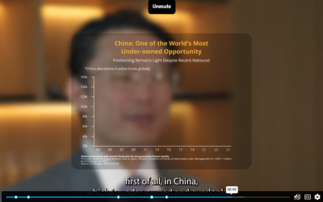Fund managers have said last night's downgrade of China's debt by credit ratings agency Moody's was "no surprise" and the immediate market impact will be limited, although they have warned about the longer-term implications for investor confidence.
Longer-term implications
However, although markets have largely shrugged off the downgrade in the short term, Aviva's Ballard warned of the longer-term implications for sectors such as banking.
"The first stage impact is that once the sovereign rating is downgraded, it is likely that most Chinese banks will have to be downgraded as well," he said.
"A rising cost of funding for the banks, unless it can be passed on, results in falling net interest margins. That in turn to the average equity investor, means lower earnings for banks stocks.
"Considering international investors are already having misgivings about investing in Chinese banks, with ICBC's H shares trading on only 6x earnings, any fall in earnings is going to do nothing to help confidence."
Luc Froehlich, head of investment directing for Asian fixed income at Fidelity International, said: "While we do not see the risk of an immediate crisis unfolding, we do closely monitor what we consider to be leading indicators.
"Top of our list is the risk of a policy mistake. Policy intervention has been the key driver for growth and stability since the financial crisis. A mis-step could send tremors across markets.
"A policy mistake could take many forms, from growth overshooting to the regulator's inability to contain shadow banking.
"Next is the risk of increased capital outflows. An ongoing drainage of liquidity could force local banks to increase their exposure to international markets.
"As international standards would be applied to assess Chinese bank stability, funding costs would probably rise, putting further pressure on the economy."
Reawakening?
Meanwhile, Schroders' Craig Botham, emerging market economist, said although the direct implications of the downgrade are limited, it may reawaken markets to China risk in a year in which many had assumed stability ahead of the Party Congress in the autumn.
"The economic impact then is small, but the sentiment impact could be large," he said.
"Our own expectation is that the policy tightening already under way will weigh on parts of the economy later in the year, but will not be sufficient to bring growth below target - or to begin a deleveraging process. Property - and as a consequence, commodities - are likely to feel the impact first.
"As to the future, we believe that the government faces a trade-off between beginning a potentially painful deleveraging process in 2018 or deferring the problem until it becomes too big to be ignored.
"We are not optimistic about the likely decision."













